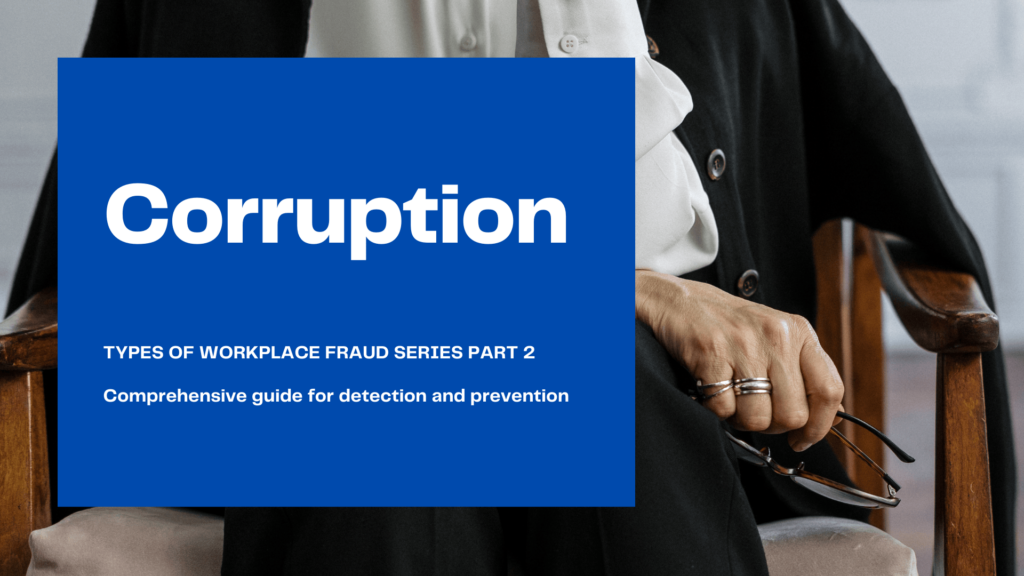One of the biggest challenges of detecting, investigating and preventing workplace fraud, is the fact that there are so many types of fraud. Each type of workplace fraud requires different methods of discovery and subsequent investigation procedures.
Our Types of Workplace Fraud series is designed to help you recognize various types of Workplace Fraud, and the best practices to minimize the risk of fraud on behalf of yourself and your clients.
In part 2 of our 4-part series on the types of Workplace Fraud, we help you understand detection and prevention measures for:
- Asset Misappropriation
- Corruption
- Financial Statement Fraud
- Data, Intellectual Property and Identity Theft

What is Corruption?
The Parliament of Australia refers to corruption as the ‘misuse of entrusted power for private gain’.
This can take many forms and appears in all levels of companies and societies. High-profile employee frauds, such as bribery and kickbacks, can damage much more than a company’s finances. This often leads to legal and civil disputes, incurring reputational and financial risk which is why workplace fraud should be prevented or controlled as soon as possible.
Corruption schemes fall under the following categories:
- Conflicts of Interest
- Bribery
- Illegal Gratuities
- Economic Extortion
Conflicts of Interest
Conflicts of interest arise when the various interests, duties or commitments that a person may have; family, friends, work, voluntary work or political interests, come into conflict.
Even the perception of a conflict of interest can be damaging to your company’s reputation. Therefore, company’s must have adequate procedures in place in order to protect the company from reputational risk.
This can be broken down into two categories:
- Purchasing Schemes
- Sales Schemes
Purchasing Schemes
This involves the overbilling of a company for goods or services by a vendor in which an employee has an undisclosed ownership or financial interest
Sales Schemes
This involves the underselling of company goods by an employee to a company in which the employee maintains a hidden interest.
Signs to look out for include:
- Numerous contracts being awarded to the same supplier under terms that were not the most commercial offered
- Common patterns in tenders being received, particularly where the same calculations, components or mistakes appear in multiple tenders.
- One employee consistently pushing for contracts to be awarded to one or a few tenders even though they may not have the best tender.
- Employees that are very guarded about their purchasing or contract awarding roles and authorities.
Bribery
A well-known type of workplace fraud; Bribery schemes, which involve the offering, giving, receiving, or soliciting of a thing of value to influence a business decision.
PwC reports that bribery and kickbacks remain a big challenge worldwide. The same study reports that bribery and kickbacks are among 5 of the most costliest frauds.
The impacts of bribery and corruption are wide reaching and may include:
- Convictions, fines and prison sentences for employees and officers
- Incurring substantial legal and professional fees, including increased cost of compliance through potential regulatory response
- Significant reputational damage at a corporate, personal and governmental level
- Damage to the share price and loss of shareholder and other stakeholder confidence
- Distortion of the market
The UK Government’s Anti-Bribery Act demands companies create an anti-bribery policy including:
- your approach to reducing and controlling the risks of bribery
- rules about accepting gifts, hospitality or donations
- guidance on how to conduct your business, eg negotiating contracts
- rules on avoiding or stopping conflicts of interest
Bribery schemes fall under three categories:
- Invoice Kickbacks
- Bid Rigging
- Price Fixing

Invoice Kickbacks
A kickback is a form of bribe paid to a person of influence within an organisation, in return for them securing some kind of benefit from their organisation. Commonly, kickbacks are paid by companies seeking to secure profitable contracts or contracts on favourable terms.
Common warning signs include:
- No competitive bidding process (or lower bids are ignored)
- Lack of appropriate supervision during the purchasing process
- Higher-than-average prices for goods or services
- Recommendation to use a vendor that others shun
- A vendor with frequent legal or regulatory problems
- Employees are too friendly with vendors
- Management pressures staff to use a particular vendor
- Vendors are in an industry where kickbacks are common
- Employees continue to use vendors that provide poor products or services
- Delivery dates are repeatedly missed
Bid Rigging
Bid rigging, also referred to as collusive tendering, occurs when an employee fraudulently assists a vendor in winning a contract through the competitive bidding process.
Some signs of possible bid rigging include:
- suppliers appear to be taking turns at winning tenders or sharing the contracts by value
- regular suppliers decline to tender for no obvious reason
- bidders appear to deliberately include unacceptable terms in their tenders
- bidders sometimes bid low and sometimes high on what appears to be the same type of supply
- you become aware that bidders meet before the close of tender, without you being present
- the winning firm regularly subcontracts to competitors that submitted higher tenders
- one firm of professional advisers represents several of the businesses submitting tenders.
Price Fixing
Bid rigging occurs when bidders on a contract conspire together to manipulate the outcome of a bidding process in their favor. Price fixing, on the other hand, is an agreement between competitors to raise or fix the price they sell their products and services for.
This type of fraud occurs when competing vendors collude among themselves to set a minimum price or price range. This makes both vendors’ prices appear competitive and ensures the company pays an inflated price no matter which vendor is chosen.
Some signs to look out for include:
- situations where competitors always announce their price increases at the same time for the same amount or have staggered price increases with some pattern, such as appearing to take turns going first.
- competitors reducing or eliminating discounts at about the same time.
- situations in which all prices seem to be uniform and all suppliers refuse to negotiate those prices.
Illegal Gratuities
An illegal gratuity is another example of workplace fraud and it occurs when someone gives something of value to an employee because he/she performs some act. Illegal gratuities are similar to bribery, except that there is no intent to influence a particular business decision, but rather to reward someone for making a favorable decision. In proving illegal gratuity, there is no need to show that the party intended to influence the person’s actions; it is enough to show that the person accepted an illegal gratuity based on their performance.
Signs that may indicate illegal gratuity include:
- Ongoing unresolved complaints about substandard performance by a contractor.
- Frequent use of contractor despite quality, cost or performance problems.
- Excessive use of a particular contractor in a competitive field.
- Apparent favoritism of a contractor by agency personnel.
Economic Extortion
This occurs when an employee demands payment from a vendor for decisions made in the vendor’s favor. Refusal to pay the extorter results in harm to the vendor.
Signs to look out for may include:
- Employee who exhibits an unexplained increase in wealth
- Employee who claims to have special influence
How Polonious can help fight workplace fraud and corruption
Corrupt actions or deviant workplace fraud may start out as isolated acts engaged in by a small number of employees. However, believing that corruption is always an isolated act can draw attention away from broader company vulnerabilities and systemic corruption issues.
After investigating each case, it is important that HR addresses the underlying issues which have contributed to the workplace fraud. This is necessary in order to achieve positive cultural changes and avoid further risk.
Critical to this change, is a robust investigation. As investigation experts ourselves, we know the tools necessary to run successful investigations. Using our digital expertise, we enhance investigation procedures and help you navigate the legal and organizational complexities of any investigation.
Continue to follow us for part 3 of our 4-part series, on prevention and detection of Financial Statement Fraud.
Let's Get Started
Interested in learning more about how Polonious can help?
Get a free consultation or demo with one of our experts




